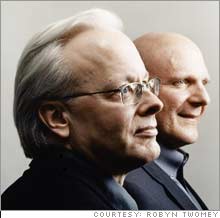Microsoft's makeover man
The software giant is in crisis, so Bill Gates has a new play to remake the company - and his name is Ray Ozzie.
NEW YORK (FORTUNE) - You might say Ray Ozzie is in training to become the next Bill Gates. Not to become the world's richest man, but rather the guy at Microsoft (Research) who does the big-picture strategic thinking to shape software and then helps develop it with company programmers. The white-haired, soft-voiced 50-year-old, only at Microsoft a year, is already spearheading a companywide transformation to remake its desktop-bound software into a new hybrid of Internet service and software on your device (which could be a cellphone, game machine, PC or even a car). (This is an excerpt from a story that ran in the May 1 issue of FORTUNE. To read the complete story, click here, or go to www.fortune.com)
Gates, Microsoft's chairman, and CEO Steve Ballmer already have so much confidence in Ozzie�a renowned programmer who created Lotus Notes, one of software's biggest triumphs�that he has become Gates' proxy in many internal meetings. Gates says he is fed up with Google (Research) being seen as the "thought leader" of the Internet Age. Ballmer says, "We have the birthright to lead the pack. We've got more technology. We've got more experience." Microsoft faces a crisis. Its stock price has barely budged since 2002 and updates to its two mainstay products�Windows and Office�have been delayed to 2007. Meanwhile, a new generation of Net businesses led by Google are hitting their stride in the marketplace and in the stock market. They make their money mostly by selling advertising. What's more, they can improve their products whenever they want, because Net software is centrally updated and controlled. Microsoft, on the other hand, must distribute code for any change to its desktop software to hundreds of millions of PCs. Ozzie's assignment is to webify everything: to intertwine Microsoft's entire product line�software for consumers, software for businesses, Xboxes, all of it�with the vast and ever-growing power of the Net. "Everything we do should have a presence on the Web," Ozzie says. Microsoft took its first big step in this direction in November when it launched Windows Live, a Web site that includes the company's new search service as well as news and e-mail. Ozzie thinks this shift to the Web will also spawn a huge advertising business. Ozzie commanded unquestioning respect on technical matters from the day he walked in, which is unheard of in Microsoft's competitive culture. "With Ray, it was like he had always been part of us," says an executive. That deference dates back to the 1980s, when Ozzie began working on Lotus Notes, a breakthrough communications and collaboration tool for internal corporate networks. Later, after IBM bought Lotus, Ozzie founded Groove Networks, which again tackled the collaboration challenge, this time using a Net-centric approach for workers in or outside of an office. Microsoft bought Groove last March. In mid-September Ozzie was named chief technology officer, and Ballmer announced a major reorganization. Most significantly, Windows and MSN were joined in a new Platform Products and Services group. It was the first outward sign that things at Microsoft were finally shifting toward the Net. Spending a 'staggering' amount of money
Now comes the hard slog of reinvigorating a 70,000-employee business. Many of the new services cut across multiple parts of the organization and will require much closer cooperation than has been common in the past. That makes for tension. Software was once a low-capital-cost industry, but not anymore. To deliver a Web-based product line, Microsoft must build a global network of server farms that will cost "staggering" amounts of money, says Ozzie. That may finally give Microsoft a use for the massive amounts of cash it has kept on hand for years ($35 billion, as of the most recent quarter). Meanwhile, the MSN group is roaring ahead. It plans 20 new products this year. One new service Microsoft has already started to deploy is online e-mail for large organizations. "We can do it pretty economically when you look at our marginal cost of hosting another mailbox in our massive infrastructure," says Ozzie. Does Ozzie's growing role at Microsoft mean Gates' is declining? Asked that question, Gates hesitates. "The big-picture strategy here at Microsoft isn't just a one-person job," he begins. Then he explains that there are five people he considers responsible for it, starting with himself, with Ozzie next. (The others are David Vaskevitch and Craig Mundie, both CTOs, and Rick Rashid, who heads Microsoft Research.) But Gates also says the strategic shift toward services "wouldn't have happened if we didn't have Ray to pull it together." Ray Ozzie is attempting to build a new Microsoft.
Fast Forward is a weekly column by FORTUNE's David Kirkpatrick. E-mail feedback to dkirkpatrick@fortunemail.com. |
| ||||||||||||||||||


